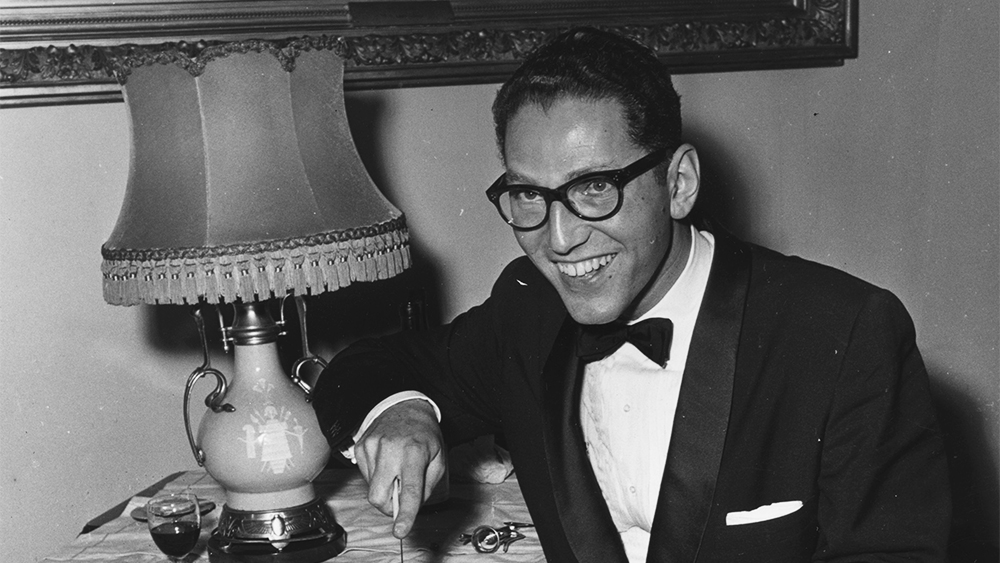Tom Lehrer, the sardonic singer-songwriter-pianist who rose to national fame after his dark, tartly funny topical songs were used on the comedic ‘60s TV news show “That Was the Week That Was,” has died at age 97.
Friends said that he was found dead in his home in Cambridge, Mass., on Saturday.
Lehrer, who acquired an underground audience in the early ‘50s with a pair of self-released albums, was by trade a professor who taught mathematics, first at Harvard and later in his career at UC Santa Cruz. He told one concert audience, “I don’t like people to get the idea that I have to do this for a living. I mean, it isn’t as though I had to do this. I could be making, oh, $3,000 a year just teaching.”
Nonetheless, his musical career took a back seat to academic work for most of his life.
A pioneer of musical black comedy during the optimistic Eisenhower years in America, Lehrer influenced the work that came later from such musical satirists as Randy Newman, “Weird Al” Yankovic and Harry Shearer.
The lean, bespectacled Lehrer essayed such then-taboo subjects as sexuality (“The Masochism Tango”), drug addiction (“The Old Dope Peddler”), homosexuality in the Boy Scouts (“Be Prepared”) and militarism (“It Makes a Fellow Proud to Be a Soldier”) on his early, self-released albums. Lehrer was lofted to fame by the caustic material he wrote for “TW3,” NBC’s U.S. spinoff of a popular British show hosted by the young David Frost.
His 1965 Reprise album “That Was the Year That Was” climbed to No. 18 on the American charts. Its razor-edged songs skewered prejudice (“National Brotherhood Week”), nuclear proliferation (“So Long Mom”) the Catholic Church (“The Vatican Rag”) and, appropriately, education (“The New Math”).
Born in New York to a Jewish family, Lehrer began studying piano at the age of 7; classically trained, he also had a youthful interest in the American pop songbook. He developed into a facile keyboardist who could essay virtually any style.
A math prodigy, he entered Harvard College at the age of 15 and graduated magna cum laude in 1946; he received his masters degree from the school just a year later, and fitfully worked on a doctorate there for 15 years. (He mocked the school’s stuffiness in his early song “Fight Fiercely, Harvard.”) He taught early on not only at Harvard but also at MIT and Wellesley, but his love of musical theater led him to try his hand at songwriting. In 1951, he wrote material for a Harvard musical revue. In 1953, he recorded a solo album, “Songs of Tom Lehrer,” in a single session at a Boston studio for $40; its cover depicted Lehrer as a devil playing the piano in hell. Initially sold on Boston campuses, it became a cult hit that sold 10,000 copies.
A second LP, “More of Tom Lehrer,” appeared belatedly in 1959, after Lehrer’s stretch in the Army. It included such fixtures of his live repertoire as “The Elements” (a rapid-fire recitation of the periodic table, in the manner of his hero Danny Kaye, set to a melody drawn from Gilbert & Sullivan’s “The Pirates of Penzance”), “The Masochism Tango” and the black-hearted ode to spring “Poisoning Pigeons in the Park.” The album led Time magazine to lump Lehrer with such “sick” comedians of the era as Lenny Bruce and Mort Sahl.
The material from the sophomore album was also recorded live at Harvard as “An Evening Wasted With Tom Lehrer,” and later released by Reprise. “Songs of Tom Lehrer” was re-recorded in its entirety for the label in 1966. His national breakthrough came in 1965 with his solo recital of the satirical topical songs he penned for “TW3.” While still maintaining his academic career, Lehrer was popular enough to tour occasionally as a solo performer before overseas audiences, punctuating his mordant material with a lupine grin.
After writing a handful of songs for the PBS educational series “The Electric Company” and appearing at fundraisers for Democratic presidential candidate George McGovern in 1972, Lehrer returned to academia for the remainder of his life, teaching math and musical theater for many years at the University of California Santa Cruz.
However, his material was recalled fondly. His music became a staple of Dr. Demento’s syndicated radio show. “Tomfoolery,” a revue of his work, was mounted in London in 1980. Rhino Records released a boxed set of his material, “The Remains of Tom Lehrer,” in 2000; Shout! Factory re-released his catalog digitally, and issued a DVD of a 1967 concert in Oslo, Norway.
Lehrer never married and leaves no children.

